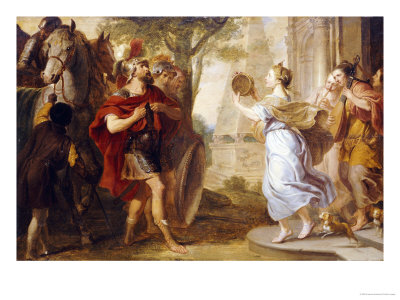Jephthah's Daughter
In Judges, there is a disturbing story in the midst of a heroic and praiseworthy leader. This man, Jephthah, was an illegitimate child, was rejected by his brothers, excommunicated from the presence of his clan, and forced to live in a land of foreigners.
In contrast to the judges surrounding his story, he did not have multiple wives and prolific numbers of children, as if to create a ruling dynasty memorializing his own heroism. Jephthah did not even have a son who would carry on his name, only a daughter, a daughter who appears precious to his very soul.
Out of fear from invading armies, his brothers called him back from the exile they imposed upon him to lead them into victory over their enemies. Jephthah's only condition was future acceptance and continued leadership of his clan. They agreed.
Jephthah cries to God for victory and out of zeal or desperation makes a vow to God, unthinkable to modern ears. If victorious, he will offer as a burnt offering whoever greets him first from his house.
Jephthah is victorious. As he marches home, he catches sight of his dwelling, with shouts of joy and affection his daughter burst forth from the house. Immediately he cries out, tearing his clothes, expressing the grief of his heart with the violence of his hands.
This daughter, his only daughter, the only hope of any heirs, is to fulfill his vow before God. The daughter acquiesces to her father's plight, and demonstrates a level of faith, a faith remarkable in the face of what is to come.
After giving his daughter time to mourn her own grief at the prospect of never marrying and bearing her own children, the vow is fulfilled.
What happened to Jephthah's daughter? Was she offered as a human sacrifice or is there more to the story? Theron Mathis
In contrast to the judges surrounding his story, he did not have multiple wives and prolific numbers of children, as if to create a ruling dynasty memorializing his own heroism. Jephthah did not even have a son who would carry on his name, only a daughter, a daughter who appears precious to his very soul.
Out of fear from invading armies, his brothers called him back from the exile they imposed upon him to lead them into victory over their enemies. Jephthah's only condition was future acceptance and continued leadership of his clan. They agreed.
Jephthah cries to God for victory and out of zeal or desperation makes a vow to God, unthinkable to modern ears. If victorious, he will offer as a burnt offering whoever greets him first from his house.
Jephthah is victorious. As he marches home, he catches sight of his dwelling, with shouts of joy and affection his daughter burst forth from the house. Immediately he cries out, tearing his clothes, expressing the grief of his heart with the violence of his hands.
This daughter, his only daughter, the only hope of any heirs, is to fulfill his vow before God. The daughter acquiesces to her father's plight, and demonstrates a level of faith, a faith remarkable in the face of what is to come.
After giving his daughter time to mourn her own grief at the prospect of never marrying and bearing her own children, the vow is fulfilled.
What happened to Jephthah's daughter? Was she offered as a human sacrifice or is there more to the story? Theron Mathis

Comments
If this is the case she definitely becomes a type of the Theotokos. I never heard that Mary was the first to be dedicated. If you know of a source on this I would love to have it.
My comments aren't working right, but here a comment that was posted earlier, but not showing now:
Tawni M has left a new comment on your post "Jephthah's Daughter": One theory I heard was that she became a nun of sorts, working with Prophet Samuel and the high priest Eli in the service of God. But it was from a source that is quite orthodox at times and way off at others. Besides, doesn't church tradition hold that Mary was the first woman to be dedicated to God in such a way?